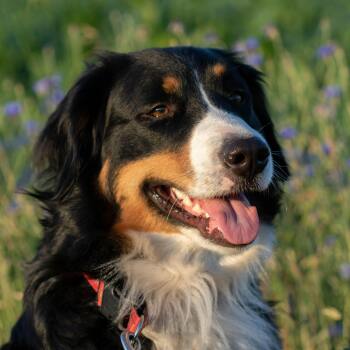Bernese Mountain Dogs

Big Dog, Bigger Heart
If you’ve got a Bernese Mountain Dog (a.k.a. a "Berner") in your life, then you know you’ve struck canine gold. These gentle giants are loyal, affectionate, and full of charm. Whether they’re leaning on you for snuggles or romping in the yard with the kids, Berners are all about being close to the ones they love.
Why Berners Win Hearts Everywhere
- Family Fanatics: Berners thrive in homes with kids, other pets, and lots of together time.
- Kind with Kids: Patient and protective, they’re a child’s gentle playmate and shadow.
- Affectionate & Devoted: If you’re looking for a cuddler, this dog is all in.
- Loyal Sidekick: Berners are deeply bonded to their humans and always close by.
- Natural Alert Dogs: While not aggressive, their bark is big enough to warn off unwanted guests.
- Smart & Willing: With positive reinforcement, these pups are eager learners.
What to Know Before You Berner
- Hair, Hair, Everywhere: Daily brushing is a must to manage shedding.
- Health Watch: They’re prone to several inherited conditions—routine vet care is essential.
- Needs to Move: Boredom can lead to digging, chewing, or general chaos.
- Slow to Grow Up: Puppy behavior sticks around a while—patience required!
- Cautious Around Strangers: Early socialization helps them warm up to new faces.
- Hot Weather Woes: These dogs were built for Swiss winters, not summer heat.
A Swiss Legacy
Berners were bred in the 1700s in the Swiss Alps to drive cattle, guard farms, and pull carts. Even today, they’re known to participate in carting events—just one more reason to admire their strength and work ethic!
A Life Well-Loved (and Well-Cared For)
Berners typically live 7–9 years. It’s not the longest time, but with the right care and early health screenings, it can be filled with comfort, fun, and unconditional love. Regular vet visits are key to staying ahead of potential issues.
Common Health Concerns in Bernese Mountain Dogs
- Bloat (GDV)— Life-threatening emergency where the stomach twists and fills with gas. Look for restlessness, dry retching, or a "prayer position." Seek emergency care immediately. Preventive surgery (gastropexy) is available.
- Hip & Elbow Dysplasia— These joint issues can cause pain and mobility problems. X-rays help with early diagnosis, and maintaining a healthy weight reduces pressure on joints.
- Osteochondritis Dissecans (OCD)— This orthopedic condition affects joint cartilage in growing puppies. Stick to a large-breed puppy diet and avoid overfeeding to prevent rapid growth.
- Cataracts— Cloudy lenses are common in senior Berners. Dogs often adjust well, but surgery is possible if vision is severely impacted.
- Bleeding Disorders (von Willebrand’s Disease)— Before any surgery, make sure your Berner is tested for clotting disorders to avoid unexpected bleeding complications.
- Arthritis— Often sneaks in with age. Signs include stiffness, limping, or reluctance to move. Early treatment—combined with joint supplements, weight control, and light activity—can ease discomfort.
- Cruciate Ligament Tears— A torn knee ligament can sideline your Berner. Surgery and physical therapy are often needed. Keep play low-impact and weight in check to reduce risk.
- Skin Allergies (Atopy)— Frequent licking, scratching, or ear infections may point to allergies. There are plenty of treatments available to manage symptoms year-round.
- Epilepsy— Seizures can be scary but are manageable with the right diagnosis and medication. Never try to restrain your dog during a seizure—just keep them safe and contact your vet.
- Addison’s Disease— This hormone disorder can mimic other illnesses. Regular electrolyte testing helps with early detection. With proper treatment, dogs with Addison’s can live full lives.
- Lymphoma— A type of cancer affecting white blood cells. Thankfully, it’s one of the more treatable cancers if caught early. Watch for swollen lymph nodes or labored breathing.
- Hemangiosarcoma— This bleeding tumor often forms in the spleen and may go unnoticed until it ruptures. Annual ultrasounds and bloodwork can help catch it before it becomes critical.
- Degenerative Myelopathy— A progressive condition that causes hind-leg weakness. Though there’s no cure, rehab and supportive therapies can slow its progression. Genetic testing can identify risk.
- Entropion— When the eyelid rolls inward and causes lashes to rub the eye, discomfort and damage can follow. Surgery is often needed and effective.
- Kidney Disease (Glomerulonephropathy)— May show up early in life. Annual urine testing helps catch it early, and diet changes can slow its progression.
- Eosinophilic Panosteitis (Growing Pains)— Young Berners may experience painful leg inflammation. It’s temporary but uncomfortable—pain meds and rest usually help.
- Pyometra— A life-threatening uterine infection in unspayed females. If you’re not planning to breed, spaying is a reliable preventative.
- Immune-Mediated Blood Disorders— Conditions like hemolytic anemia or thrombocytopenia can cause bleeding, lethargy, or bruising. Blood tests before procedures can be lifesaving.
- Portosystemic Shunt (Liver Shunt)— This congenital issue disrupts normal liver function. Symptoms may include stunted growth and neurological changes. Surgery or medication may be needed.
Ready to Learn More? We’re Here to Help!


